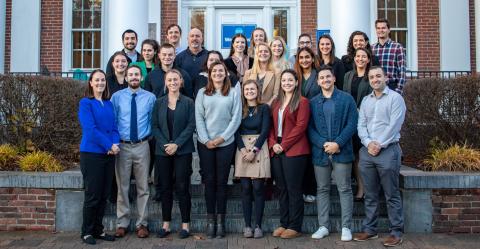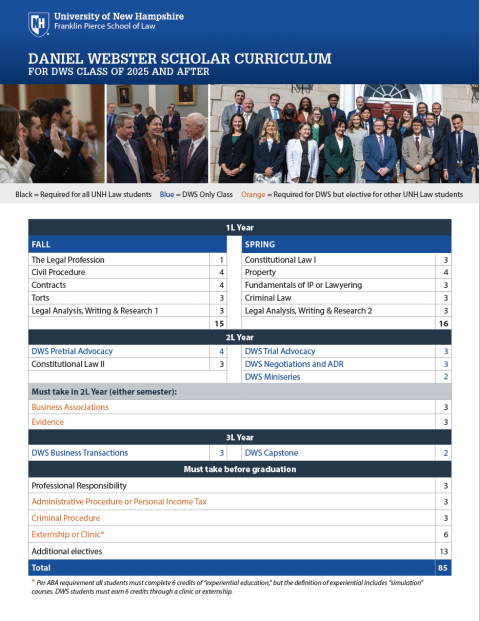
First in the Nation
UNH Franklin Pierce broke new ground in client-ready legal education with the Daniel Webster Scholar (DWS) Honors Program, a first-of-its-kind program in the country allowing students to graduate without the need to take the traditional two-day bar exam. Successful Webster Scholars pass a variant of the New Hampshire Bar exam during their last two years of law school and are sworn into the New Hampshire bar the day before graduation. They are also eligible to sit for the bar exam in any jurisdiction outside New Hampshire for which they would qualify having graduated from an ABA-accredited law school. Alumni of the program have been admitted to more than a dozen other bars throughout the country.
Legal Education’s Future
The DWS program was the subject of a two-year independent study by the Educating Tomorrow’s Lawyers Initiative of the Institute for the Advancement of the American Legal System (IAALS) at the University of Denver. The on-site research was conducted by William Sullivan and Lloyd Bond, the lead author and psychometrician for Educating Lawyers, also known as The Carnegie Report. The 2015 report proclaimed that Daniel Webster Scholars are “Ahead of the Curve.” The study found that DWS students were outperforming their colleagues in the field who had been licensed to practice law for up to two years.
Also in 2015, the DWS program was featured by several national media outlets, including the Wall Street Journal and The New York Times. The program was also one of only three recipients of the E. Smythe Gambrell Professionalism Award from the American Bar Association (ABA) in 2015, with the ABA recognizing it as “an exemplary and extraordinarily innovative approach.” The award honors “excellence and innovation in professionalism programs by law schools, bar associations, professionalism commissions and other law-related organizations.”
Students are accepted into the program prior to their second year of law school and discover first-hand what it takes to succeed in today’s legal marketplace. They hone their skills in both simulated and real settings - counseling clients, working with practicing lawyers, taking depositions, appearing before judges, negotiating, mediating, drafting business documents - while creating portfolios of written and oral work for bar examiners to assess every semester.
Years in the making, DWS is a collaboration between UNH Franklin Pierce, the New Hampshire Supreme Court, the New Hampshire Board of Bar Examiners and the New Hampshire Bar Association. The program remains without parallel at any other law school and has drawn praise from judges, lawyers, and legal education scholars around the country.
Contact Information
Courtney Brooks
Professor of Law Director,
Daniel Webster Scholar Honors Program
Email: courtney.brooks@law.unh.edu
Phone: (603) 513-5233
Helen Dugan
Administrative Coordinator,
Daniel Webster Scholar Honors Program
Email: helen.dugan@law.unh.edu
Phone: (603) 513-5117
Explore DWS
During the second and third years of school, Webster Scholars complete a wide range of courses, including specific, intensive Daniel Webster Scholar Honors Program courses. Students demonstrate their developing professional skills and judgment in simulated, clinical, and legal residency settings, and compile a portfolio of work.
Several times during the program, Webster Scholars are required to demonstrate their ability to practice law before judges, lawyers, New Hampshire Bar Examiners, faculty, and classmates. Students must show that they know how to listen, creatively solve problems, make informed judgments, recognize and resolve ethical problems, negotiate and counsel people effectively, and be committed to continuing their education and contributing to the profession.
Webster Scholars may also choose electives. A limited number of the courses required of Webster Scholars will be open only to Webster Scholars. See the University of New Hampshire School of Law Curricular Guide for more information.
Webster Scholars graduate with the rest of their class, assuming all other requirements are met. Although the work is rigorous, the courses required of Webster Scholars count as credits toward graduation. Although summer school is an option, Webster Scholars can complete the work within the regular academic schedule.
Course requirements and sequencing
GPA: Webster Scholars must graduate with a cumulative GPA of at least a B (3.0) (3.0 is not required for admission). Daniel Webster Scholar (DWS) Specific Courses: No grade below a B- (2.67) in any DWS-only designated course.
- DWS is a national model to train new lawyers
- DWS and legal residency program praised - New York Times
- DWS Director John Garvey Recognized for Distinguished Service to the Legal Profession
- DWS Director John Garvey Receives Frank Rowe Kenison Award from NH Bar Foundation
"DWS has catapulted me to a level I thought I'd be at after practicing law for many years. Because of the training I received in the DWS program, I am now able to make quick and practical decisions when faced with client issues. I know how to manage expectations and keep clients satisfied so they will come back to me with other legal problems." - Eman Pahlevani, J.D. 2013
Q: Can Webster Scholars practice in other states?
- Yes. Admission to practice in New Hampshire is a benefit, not an obligation. In addition to being admitted to practice in New Hampshire, Webster Scholars are eligible to sit for the bar exam in any jurisdiction for which they would otherwise qualify, based upon their graduation from an ABA accredited law school.
Q: Who is eligible to apply?
- J.D. students newly admitted to UNH Franklin Pierce who express an interest in DWS on their application will be invited to apply early admission. A limited number of students will be conditionally admitted through this process.
- First-year J.D. students at UNH Franklin Pierce may apply following midterm examinations during their second semester.
- Selection is based upon a student’s demonstrated overall ability to succeed in the program, including academic, professional and interpersonal strengths. Enrollment is limited.
Q: How does the program work?
- During the second and third years of school, Webster Scholars complete a wide range of courses, including specific, intensive Daniel Webster Scholar Honors Program courses.
- Students demonstrate their developing professional skills and judgment in simulated, clinical and residency settings and compile a portfolio of work.
- Several times during the program, Webster Scholars are required to demonstrate their ability to practice law before judges, lawyers, New Hampshire Bar Examiners, faculty and classmates. Students must show that they know how to listen, creatively solve problems, make informed judgments, recognize and resolve ethical problems, negotiate and counsel people effectively and be committed to continuing their education and contributing to the profession.
- Upon completion, students are admitted to the New Hampshire Bar.
Q: Will Webster Scholars graduate on time with the rest of their class?
- Yes, assuming all other requirements are met. Although the work is rigorous, the courses required of Webster Scholars count as credits toward graduation. Although summer school is an option, Webster Scholars can complete the work within the regular academic schedule.
Q: Toward what practice areas is the curriculum geared?
- The goal of the program is to prepare law students to be ready to practice in the broad sense, rather than concentrating on a specific practice area.
- Exposure to numerous fields, including real estate, business and litigation is offered. As with a traditional bar exam, there is exposure to a broad area. However, instead of a two-day bar exam, the program provides a two-year, comprehensive exam in conjunction with the training received.
Q: Will Webster Scholars still take classes with other students?
- Yes. Webster Scholars may also choose electives. Some of the courses that are required of Webster Scholars are electives for other classmates. A limited number of the courses required of Webster Scholars will be open only to Webster Scholars.
Q: Who should consider applying to the Daniel Webster Scholar Honors Program?
- Anyone who plans to practice law, who wants to maximize their preparation with intensive, practice-based training and strives to be client-ready.
Q: Does it make sense to be a Webster Scholar if you are intellectual property oriented?
- Yes. It’s a personal decision, but the current IP Webster Scholars are glad they chose to be in the program.
Q: Can Webster Scholars do legal residencies?
- Yes. In fact, the program requires a total of at least 6 hours of legal residency and/or clinic. You can also do a full-time legal residency during your 3-L year, but it needs to be within driving distance of Concord, so you can make it to your Daniel Webster Scholar class. Depending upon your driving skills, this would easily include the Boston area or beyond.
Selection process for Webster Scholars
Each year in June a committee composed of professors and graduated Daniel Webster Scholars selects the next class of Webster Scholars. The committee selects Scholars based upon a holistic assessment of each applicant. Because enrollment is limited, the committee seeks an overall balanced group from the pool of qualified applicants.
In addition to each individual's qualifications, the committee considers personal experiences including, but not limited to urban/rural background, education, culture, life/work experience, travel, extra- curricular activities before and during law school, hobbies, and goals for the applicant’s legal career. The committee also considers whether an applicant is likely to remain in New Hampshire in order to balance the class between prospective New Hampshire and non-New Hampshire practitioners.
Selection criteria for Webster Scholars
The committee seldom has information on any applicant that touches upon all of the characteristics identified below. The committee uses this list as an aide for holistically evaluating and then comparing each candidate. Information is gathered from the application materials, the interview, references and personal observation of committee members and others who have had contact with the applicants. The committee considers both positive and negative information and attempts to determine each student’s potential with respect to the following criteria:
Professional relationships
- Have integrity and engage in honest discourse
- Treat themselves and others with respect
- Work well with others, acknowledging their own and others' strengths and weaknesses
- Show empathy and kindness to others
- Listen attentively – know when to listen and when to contribute
- Have humility – admit to mistakes and make apologies
Professional development
- Are committed to working as part of a learning team
- Are motivated to improve – engage in a continuous process to improve their own and their classmates’ performance
- Eagerness to learn new skills
- Learn from mistakes and are willing to take risks
- Seek – and learn from – feedback
- Are open to new ideas, seeing things from others’ perspectives, and sharing their views
- Are committed to developing strong written and oral skills
Personal responsibility
- Have a strong work ethic – maintaining positive relationships, staying productive, and managing stress when faced with a demanding workload and multiple deadlines
- Seek to serve and help others, through volunteer projects or extracurricular activities
- Are committed to continual professional and personal development and a healthy life balance
Academic competency
- Demonstrate academic skills sufficient to maintain a cumulative GPA of at least 3.0 upon graduation and to obtain at least a B- in any Daniel Webster Scholar course.
How to Apply to the DWS Program
Who should apply? Anyone who plans to practice law, wants to maximize preparation with intensive, practice-based training, and strives to be client-ready should consider applying to the Daniel Webster Scholar Honors Program.
First-year J.D. students of UNH Franklin Pierce may apply during their second semester. Selection is based upon a student’s demonstrated overall ability to succeed in the program, including academic, professional, and interpersonal strengths. Enrollment is limited.
For more information on the application process, please contact Helen Dugan, the Program Coordinator.
